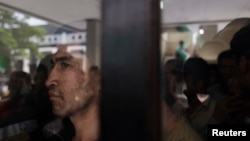The notion of refugee life evokes many associations: destitution, duress, scarcity. But the overwhelming fact of many refugees’s daily lives is boredom.
Like the Hazara refugees of West Java, whose days bleed into months into years. They can’t work, enroll in school, or travel; ignored by Indonesia’s government, which does not recognize refugees, they wait their turn on backlogged UNHCR lists to be resettled somewhere like Germany or the U.S.
There’s a sizable population of Hazara refugees — a Persian-speaking ethnic minority — in the small town of Cisarua, near Bogor. Hundreds of them came to Indonesia via plane and boat in the last five years, fleeing persecution in Afghanistan — where they make up the country's third-largest ethnic group — Pakistan, and Iran.
Indonesia was initially conceived as a pit stop en route to Australia, but since that country cracked down on asylum seekers who arrive by sea, Indonesia has become sort of a purgatory. The Hazara chose Cisarua because its climate, in the Javanese hillside, is cooler and more tolerable, and they can rent houses cheaply instead of adjusting to cramped apartments in Jakarta.
After they realized the magnitude of their wait, several refugees created an ad hoc school for the children, the Refugee Learning Center (RLC), in 2014. Starting as an informal class, it has expanded into a six-room schoolhouse with classes for adults and children, including a library, English classes, and an indoor football league.
“We asked the UNHCR to help us with some kind of educational program for three months, but after getting no response, we decided to just go for it and started a class on our own with 18 kids,” said Asad Shadan, the founder of the RLC. “Within six months we had 100 children enrolled, and now we have 200 students and 16 teachers. It gives all of us something to do.”
Thanks to donations over the last couple years, RLC now has a sizable library. Although the Hazaras’ mother tongue is Farsi, many of them, especially the younger ones, speak flawless, idiomatic English. “We have a lot of time to practice,” jokes Shadan.
As we walked from the schoolhouse to the indoor football field where the RLC oversees a youth sports program, a classroom of adults learning English were repeating after their teacher, “This is/ a piece/ of chicken.”
Futsal
The RLC’s indoor football, or futsal, program has quickly become the highlight of the school's activity roster. They run three leagues, two for boys and one for girls. Teams practice twice a week and play competitive matches every Friday.
They used to practice on an open field, which was less than ideal because of the constant rain in the region. But for the last six months, a donor has helped them rent a real indoor court for a few hours each week.
On a recent Tuesday afternoon, the girls’ team, about twenty players age 12 to 20, turned out for drills in spangled hijabs, track pants, and neon cleats. Although all the Hazara kids are grateful for an athletic outlet, this team is doubly so because they can’t play sports in their home countries.
“The society was very conservative back in my home country, especially in my own society, community Hazara,” said Madiha Ali, a 17-year-old from Quetta, Pakistan. “Girls were not allowed to play football and do sports.” Ali, who teaches math at RLC and has written a novel-length memoir of her experience, said futsal is the highlight of her week. “I love it. Football is my passion, because it’s not only sports, where we come and pass our time, it’s something more than that… it’s like a passion, where you come and forget all your worries and tensions.”
Atifa Zamiri, a 17-year-old player originally from Afghanistan, echoed this. “We really need relaxation, and it really relaxes our mind and feelings,” she said.
Shadan is leading a crowdfunding campaign to sustain the RLC because the refugees are not allowed to work, so all their programming thus far comes from donations and the savings that the refugees brought with them. “The Indonesian government pretends that we don’t exist,” said Shadan.
Marked men
The cheerful forbearance of the refugees, both adults and children, is remarkable when considering that the Hazara spend their whole lives as marked men. Because of their East Asian features, they are walking targets in many parts of Afghanistan, said Shadan.
“How can we hide when it’s written all over our face that we are Hazara?” he said.
Shadan, who used to work as a researcher for an Australian firm, left his hometown of Jaghori in 2014 after the Taliban accused him of spying and threatened his wife and parents.
He asked for help at Kabul’s human rights ministry, but they declined. So in a matter of days he left, first to India, then Malaysia, and finally to Indonesia, where he landed in Sumatra by boat. He left his pregnant wife behind; he has never seen his two-year-old son except in photos.
In Cisarua, Shahad is like a communal older brother, helping kids cross the street, ribbing them about their futsal technique, and familiar with every lesson plan that’s underway. Despite the absurdist nature of their predicament, the refugees are relentlessly productive.
“What we want to avoid is that, once resettled, we don’t have any skills, or that the kids have been wasting formative years of their education,” said Shahad.
And they are being resettled, but at a slow trickle.
Masoma Faqihi, a 20-year-old who plays futsal in a black sequined hijab, said her family of six has finally been approved to go to the U.S., after more than three years in Cisarua.
“I like teaching at the school here but I’m just about done with school for myself, I think,” she said. “I heard you can do anything in America, though, so really, I want to be a makeup artist. Wish me luck!”








